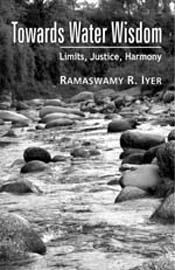Apr 14, 2025
Apr 14, 2025
Book: "Towards Water Wisdom - Limits, Justice, Harmony"; As Iyer, honorary research professor at the Centre for Policy Research, New Delhi, points out, the words "limits, justice and harmony have multiple meanings" in the context of water. The book comes on the eve of the World Water Week being marked in Stockholm Aug 12-18, which is an international annual forum for exchange of views and experiences between members of the scientific, business, policy and civil society communities in order to advance efforts related to water, the environment, livelihoods and poverty reduction.
Author: Ramaswamy R. Iyer; Publisher: Sage Publications, India; Price: Rs.350.

One can live without land and space, but without water there can be no life, neither the individual's nor the planet's. Wisdom about water does not yet exist, to say the least. Ramaswamy Iyer's second book on water "Towards Water Wisdom", therefore, is a directional tome, outlining clearly the issues for a beginner on the issue.
Iyer begins with the urban and rural water scenario in India, irrigation usage, the water treaties, the disputes and, in very short definitions, gives the reader a clear picture of what the hullabaloo is about.
He also explains the 'pari passu' principle, a condition in which construction (of dams, power plants, etc.) is not allowed to outpace environmental and rehabilitation work.
"The idea was that the pace of environmental and rehabilitation work should determine the pace of construction work," says Iyer, who was secretary in the water resources ministry in the 1980s.
In 2007, just the opposite has become the guiding principle in India's official practice regarding water - in terms of dams, power projects, ports and oil fields, he points out.
In his latest book, the author is also critical about arguments tendered about the "cost of delay". This is the justification that those who don't want to stop building projects usually give, he says .
Asks Iyer, "Have those arguing against delay asked themselves what each day's delay in rehabilitation means in money and pain for the project affected persons?"
Talking about legal delays, he also asks more uncomfortable questions like, "Did the NBA (Narmada Bachao Andolan, the NGO fighting for rehabilitation of people displaced by the Sardar Sarovar mega-project) ask the Supreme Court to take six years to deliver its judgment?"
Why did Medha Patkar take the issue to court is answered by two other questions that Iyer asks, "What powers have the people of India been able to exercise?" and "are peaceful protests ineffective?"
Dams versus rehabilitation is India's most important conflict across every state, be it on the Narmada or the Mullaiperiyar.
Along with the disputes between states are India's water disputes with neighbours like Pakistan and Nepal - listed by Iyer as major conflicts.
"Market environmentalism" is an oxymoron, he says, adding, "people's right to water is fundamental. It cannot be snatched either by the private sector that advocates 'priced water' nor by the government in the name of development".
"Sustainable development is about more than equity and fairness in the contemporary context. Outcomes will depend on inter-generational issues. The ability to anticipate and prepare for future situations is a challenge," says the World Water Forum on the water debate.
Iyer's book is a one-stop-shop on water in the Indian context.
13-Aug-2007
More by : Papri Sri Raman